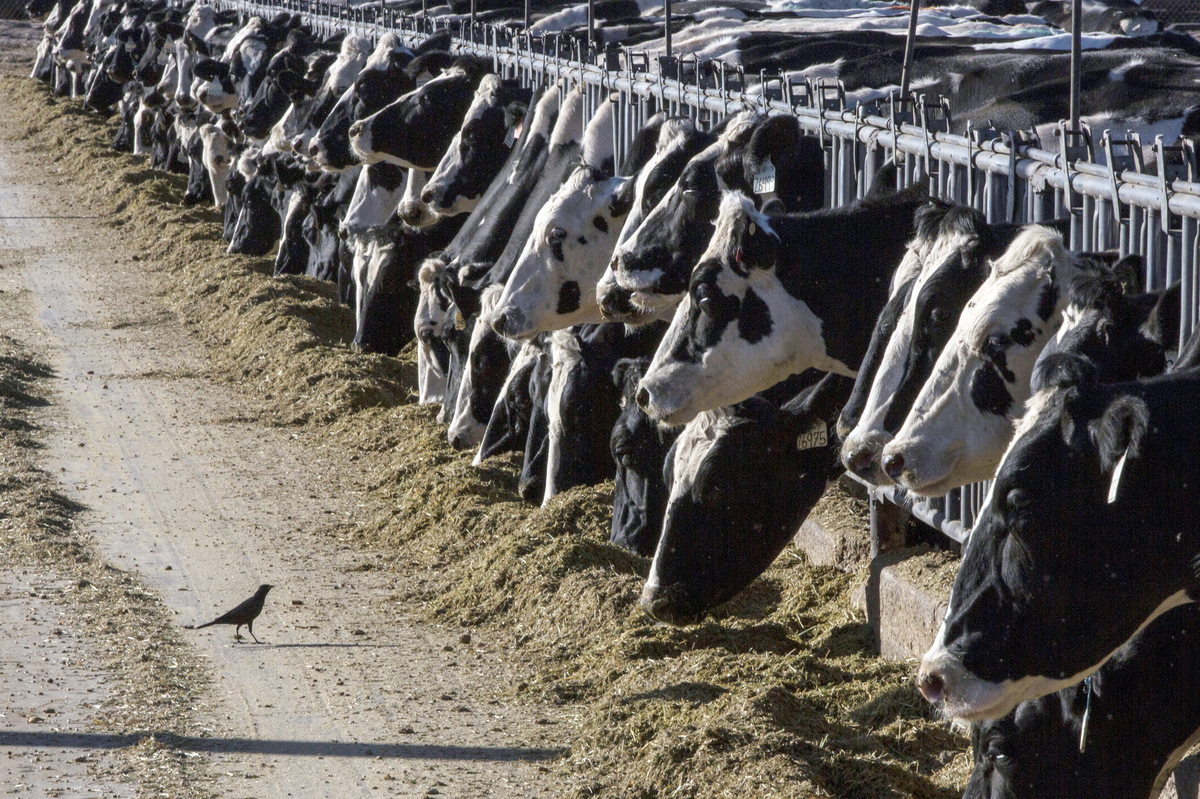
Dairy cattle feed at a farm on March 31, 2017, close to Vado, N.M. The U.S. Division of Agriculture says cows in a number of states have examined constructive for hen flu.
Rodrigo Abd/AP
disguise caption
toggle caption
Rodrigo Abd/AP

Dairy cattle feed at a farm on March 31, 2017, close to Vado, N.M. The U.S. Division of Agriculture says cows in a number of states have examined constructive for hen flu.
Rodrigo Abd/AP
Livestock at a number of dairy farms throughout the U.S. have examined constructive for hen flu — often known as extremely pathogenic avian influenza, or HPAI — in an outbreak that is seemingly unfold to not less than 5 states.
The U.S. Division of Agriculture’s Animal and Plant Well being Inspection Service confirmed Friday that cows in Texas, Kansas and Michigan had been sickened by the virus, and there have been presumptive constructive check outcomes for extra herds in New Mexico and Idaho.
It is the first time the illness has been present in dairy cattle, in line with the American Veterinary Medical Affiliation.
The instances come simply days after a bunch of younger goats contracted hen flu on a Minnesota farm.
Chicken flu infects the respiratory and gastrointestinal tracts of birds and is commonly deadly to avian populations. It could unfold from wild birds to industrial poultry and yard flocks in addition to terrestrial and marine mammals and people.
Authorities officers say the chance to the general public amid the present outbreak stays low. Most previous human infections have occurred after folks had “unprotected exposures to sick or lifeless contaminated poultry,” in line with the Facilities for Illness Management and Prevention. And officers say the pressure of the virus detected in Michigan is much like the one present in Texas and Kansas, which was proven by way of preliminary testing to not embody any modifications that may make it extra transmissible to people.
The rash of hen flu infections also needs to not dramatically influence customers of dairy merchandise, federal and state officers say.
“Understanding the small print surrounding the switch of avian virus to livestock is the highest precedence of animal well being professionals and agriculture businesses,” Texas Agriculture Commissioner Sid Miller mentioned in an announcement. “Whereas troubling, this outbreak will not be presently anticipated to threaten our nation’s industrial dairy provide.”
There may be nearly no influence on customers thus far
The nation’s industrial dairy provide is secure and a milk recall is pointless, the USDA says.
That is as a result of dairies are required to divert or destroy any milk from impacted livestock, and solely milk from wholesome cows might be processed for human consumption.
Moreover, pasteurization — which is required for milk coming into interstate commerce — kills micro organism and viruses, together with influenza.
The Meals and Drug Administration says there may be restricted data out there concerning the transmission of hen flu in uncooked, unpasteurized milk. The company has lengthy warned folks to keep away from uncooked milk, which it says can harbor harmful micro organism and sicken customers.
Federal officers say the lack of milk from in poor health dairy cows is just too restricted to considerably influence the industrial provide, which is usually larger within the spring attributable to elevated seasonal manufacturing. Dairy costs will not be anticipated to rise as a result of outbreak, they added.
How regulators and farmers are working to include the unfold
The USDA believes the dairy cows have been sickened by a pressure referred to as H5N1, Eurasian lineage goose/Guangdong clade 2.3.4.4b, which was seemingly launched by wild birds. Pigeons, blackbirds and grackles had been recognized on the affected Texas farms.
However federal officers are additionally not ruling out the potential for cow-to-cow transmission. That is after a Michigan farm lately obtained a cargo of cattle from an affected Texas farm earlier than any of the cows present indicators of illness, the Michigan Division of Agriculture and Rural Growth mentioned Friday.
Cows sickened by hen flu at affected dairy farms have recovered “after isolation with little to no related mortality reported,” in line with the USDA.
Federal and state businesses are persevering with to check sick livestock and unpasteurized milk samples.
The USDA additionally recommends that farmers and their veterinarians follow “good biosecurity,” which incorporates limiting animal actions, testing livestock earlier than they’re moved and isolating sick cows.

